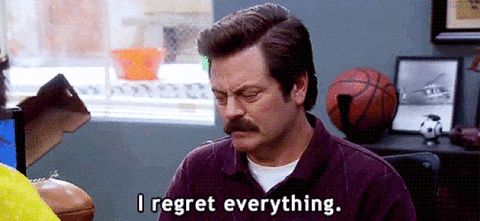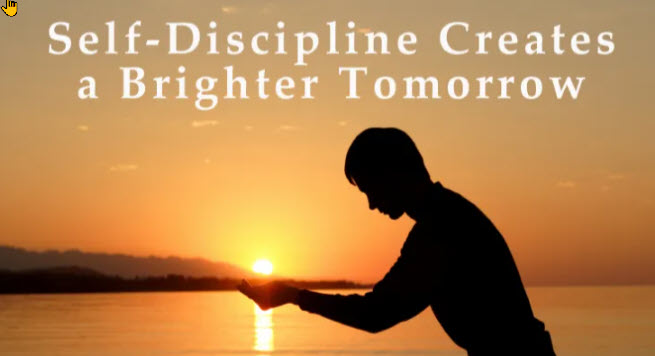How to Avoid a Life of Regret

When many people hear the word discipline, it conjures up negative feelings. Feelings of being controlled, being told what to do, restricted, and trapped. Rightly so. Growing up, we’ve all had to deal with parents and teachers trying to get us to do things we don’t want to do. In that perspective, discipline is negative in a way. avoid regret
What about SELF-discipline? Since you’re disciplining yourself, a choice you are making, the definition changes. It went from others making you do things you don’t want to do at the moment to making yourself do things you might not want to do at the moment. The difference is that self-discipline is a choice you decided to make in order to improve yourself in some way or to simply get something done.
What is Self-Discipline?
Simply put: Getting yourself to do the things you need to do when you need to do them whether you feel like it or not.
The Rewards
There are tons of rewards for having self-discipline with the obvious one being that you get more things done. There’s also the sense of satisfaction and pride of accomplishment. Imagine being in a position where the majority of your goals are reached. What a feeling that would be!
Probably the greatest reward though, is not having that feeling of regret. There’s a saying:
“We must all suffer from one of two pains: the pain of discipline or the pain of regret. The difference is discipline weighs ounces while regret weighs tons”.
For more about this subject, look inside:

12 Rules for Life
by Jordan B. Peterson
That feeling of regret and thoughts of “I should’ve” are some of those things in life that’s hard to get over. Even a nasty break up will heal over time. But regrets, those can last a life time. You’ll always be left wondering, “if only”. It’s a feeling no one wants to have. If that’s the case, shouldn’t everyone have the self-discipline to do whatever is necessary to accomplish their goals?
The Challenge
Unfortunately, there’s a thing call instant gratification and procrastination. We don’t do the things we know we should do when we need to do it because NOT doing it is more pleasurable at the time, so we just put it off. Psychologists say we do things for one of two reasons:  To gain pleasure or to avoid pain. The reason we fail to follow through on what we need to do is we look at the short-term pleasure of NOT doing it or the short-term pain of doing it.
To gain pleasure or to avoid pain. The reason we fail to follow through on what we need to do is we look at the short-term pleasure of NOT doing it or the short-term pain of doing it.
If you wanted to discipline yourself to workout every day, the goal would be to get yourself to do it long enough until it becomes a habit, but until then, you need to focus on the long term rewards of following through instead of any short-term benefits or pain avoidance you might have come up with to persuade yourself not to follow through.
How to Develop Self-Discipline
1. Get clear on the end result and have strong enough reasons for getting it.
You have to know exactly what it is you want to accomplish and know why you want to accomplish it, otherwise temptations can easily take you off track. When you have a purpose and reasons behind that purpose greater than any short-term satisfaction you can come up with, it will be easier to fight off temptations to get off track. If you don’t, you’ll be in for a rough ride.
The Importance of Healing Emotional Wounds By Corie Chu
2. Create a sense of regret for NOT following through immediately.
Instead of having regrets later on for not doing something you intended to do, why not create that feeling of regret right away, so afterwards, you can actually do something about it to change it? To do this, you’d have to visualize yourself sometime in the future where enough time has passed by that you can’t do anything to change the situation. How would your life be 5 or 10 years from now if you keep putting off things you know you should be doing? Where would you be physically, financially, and emotionally? Really feel the pain. Imagine looking into the mirror and seeing your future self. If you really get into it, it can be an emotional and inspiring experience. When you snap back to reality, you’ll have a sense of great relief knowing that you can change that future of regrets.
Related Post: 20 of the Most Powerful Affirmations of All Time
3. Take smaller steps.
Often times, we set ourselves up for failure and when we do fail, we blame it on ourselves and our self-esteem goes down. Here’s what I mean. If you wanted to get into shape and haven’t been working out for the longest time and suddenly decide you’re going to start going to the gym everyday for 2 hours, you might be disappointed. Take smaller steps. Start out with something you’re confident you can do like 20 minutes a day, then build up.
4. Evaluate your strategy.
Sometimes you’ll run into a situation where you’re disciplining yourself perfectly. You’re getting yourself to do what you intended to do, yet you find that you’re not getting the results you want. Just remember to evaluate your strategy. Know what’s working and what’s not and do more of what’s working and less of what’s not.
5. Start with the little things.
Developing self-discipline is like building a muscle. The more you do it, the stronger it will get. If you have a hard time getting yourself to do things like go to the gym, work on your business, or even getting up before noon in the morning, you need to start disciplining yourself with the little things. Make it a goal to finish everything you start even if it’s something simple like cleaning your room or mowing the lawn. When you continually do this, you’ll get into the habit of getting yourself to keep going even if you no longer feel like it. As your self-discipline muscles get stronger and stronger, those bigger projects will become easier and easier to do.
Conclusion
Self-discipline is one of those “traits” that you must have if you want to be successful. Anyone can do anything if they feel like it. It’s the person who doesn’t feel like it but does it anyway who gets ahead of everyone else. Fortunately, it’s something you can develop through repetition.  The more you discipline yourself to do certain tasks even when you don’t feel like it, the easier it will become because those actions you’re taking will eventually become habits. Once things you dreaded doing but you know you must do in order to achieve your goals become habits, you’ll make it look easy. That’s when life starts to get interesting. So don’t just read this and decide to get started when you feel like it, get started now!
The more you discipline yourself to do certain tasks even when you don’t feel like it, the easier it will become because those actions you’re taking will eventually become habits. Once things you dreaded doing but you know you must do in order to achieve your goals become habits, you’ll make it look easy. That’s when life starts to get interesting. So don’t just read this and decide to get started when you feel like it, get started now!
Source: motivationalwellbeing.com
Another Word on Discipline From Dr. Jordan B. Peterson
Discipline requires certain behavior. Consider adopting Dr. Jordan B. Peterson’s 12 Rules For Life. Dr. Peterson’s book is a #1 bestseller…over 3 million sold throughout the US, Canada, the UK, Australia, New Zealand, Sweden, the Netherlands, Brazil and Norway, and now slated for translation into 50 languages.
Rule 1 Stand up straight with your shoulders back
Rule 2 Treat yourself like you would someone you are responsible for helping
Rule 3 Make friends with people who want the best for you
Rule 4 Compare yourself with who you were yesterday, not with who someone else is today
Rule 5 Do not let your children do anything that makes you dislike them
Rule 6 Set your house in perfect order before you criticise the world
Rule 7 Pursue what is meaningful (not what is expedient)
Rule 8 Tell the truth – or, at least, don’t lie
Rule 9 Assume that the person you are listening to might know something you don’t
Rule 10 Be precise in your speech
Rule 11 Do not bother children when they are skate-boarding
Rule 12 Pet a cat when you encounter one on the street
Source: jordanbpeterson.com
Blog Companion Book
What makes us different from other inspirational/motivational online content providers is our monthly
Wave of iNspiration Showcase!
Each month the Showcase features a new Blog, Video, Book, and Quote, highlighting an inspirational, motivational, and educational topic from the industry’s most influential writers, bloggers, authors, and publishers.
 ↓
↓
Trending throughout iNation…
- Why Today’s Young Men Are Running from Today’s Modern Women by Nancy Wilson
- 5 Ways to Stop Your To-Do List Anxiety And Actually Feel in Control
- The heart-warming story about Hachiko – A Dog who taught us about loyalty and love!
- The Myth Behind Why Being Busy Makes You Feel Important by Heather Picard
- How to Be an “Imperfectionist” By Stephen Guise
- Leadership Excellence – A Model for Sustained Success By Dr. Philip A. Iannuzzi, Jr. (Retired Colonel, U.S. Air Force)
- We Have A Manchild Problem, And It’s Scaring Everyone
- 7 Reasons You Are Unsuccessful. It Isn’t Because You’re Lazy. It’s This.
- If Technology Connects People Why Are People Lonelier Than Ever
- We’re all beginners in life who’ve been given a lot of advice…just be sure not to ignore these 7 powerful pieces!
- The Law of Attraction – How to Attract Positive Outcomes in Your Life
- 20 of The Most Powerful Affirmations Of All Time
- Why Today’s Young Men Are Running from Today’s Modern Women
- Unleash Your Inner B.A.D.A.S.S. — Changing Core Beliefs That Hold You Back by John Krasinski
- How To Be Yourself and Stop Trying To ‘Fit In’ By Darius Foroux


 To gain pleasure or to avoid pain. The reason we fail to follow through on what we need to do is we look at the short-term pleasure of NOT doing it or the short-term pain of doing it.
To gain pleasure or to avoid pain. The reason we fail to follow through on what we need to do is we look at the short-term pleasure of NOT doing it or the short-term pain of doing it. The more you discipline yourself to do certain tasks even when you don’t feel like it, the easier it will become because those actions you’re taking will eventually become habits. Once things you dreaded doing but you know you must do in order to achieve your goals become habits, you’ll make it look easy. That’s when life starts to get interesting. So don’t just read this and decide to get started when you feel like it, get started now!
The more you discipline yourself to do certain tasks even when you don’t feel like it, the easier it will become because those actions you’re taking will eventually become habits. Once things you dreaded doing but you know you must do in order to achieve your goals become habits, you’ll make it look easy. That’s when life starts to get interesting. So don’t just read this and decide to get started when you feel like it, get started now!
 ↓
↓


32 thoughts on “How to Avoid a Life of Regret”
“Developing self-discipline is like building a muscle.”. This is a great analogy, I’ve never thought of it like that. I guess if you don’t use it you’ll lose it, just like everything else.
Yes, Trish, and the strength of that self-discipline muscle lends itself to building your ability to make sacrifices, which then leads to better things in your future that you bargained for by delaying gratification in the present for a more meaningful outcome in your life. Stay iNspired!
“The successful among us learn how to delay gratification and bargain with the future.” – Jordan B. Peterson
I do not think that we can fully avoid a life of regret but we can reduce it. As mortals we are bound by not being perfect which meant we are prone to mistakes and failures. The key for me is the effort we put in to regret less as it all boils down to our choices. Good thought though.
Gonzalo – You are correct, the choices we make are the key to all future outcomes. Make good choices, be rewarded. Make bad choices, and invite chaos into your life.
To avoid the statement “I regret ……..”, then you should learn to forgive. Create a sense of regret for NOT following through immediately is an issue to tackle. The truth is to let go off Amy issues.
Good point, Oyeyipo. Stop procrastinating when it comes to fixing your problems. Also, stop blaming others, just fix it and watch the good come your way!
human as we are, we have the tendency to be immature with regards to our decisions in life. we just need to accept the reality and the consequences of our actions. it is really hard to foresee things clearly especially if you are in an episode of your life that is unnatural and unreal.
Wow, you hit the mark, Conrad. Very few are willing to let go of their immature feelings and beliefs about how they should conduct themselves. We all need to mature, work on letting go of the childhood tendencies that have such a stronghold on our subconscious, and take responsibility for our actions.
I may have done a lot of mistakes and bad decisions before and I already served my consequences and that made me wiser and always think before I decide. To avoid life full of regret, always respect life, love and live to the fullest.
Think about what that one word you mentioned, Janine…”consequences”, very insightful because very few people ever take into consider the most meaningful aspect decision making: the CONSEQUENCES resulting from their chosen behavior. Funny thing is that deep down everyone intuitively knows they are doing the right or wrong thing. The question then becomes, why does someone choose the behavior that produces bad outcomes?
I loved your article, and I agree regarding how self decipline is the best option instead of procrastinating and acumulating regrets.
Yes, Danielle. Discipling is such an incredible life force. What it really means is sacrifice. If people can build a skill set to sacrifice immediate gratification in the present in turn for future reward, their lives and the world would be a much better place. I wonder why people aren’t willing to make sacrifice, postpone gratification, even if they know it inherently benefits them in the long run.
That’s right! Self-discipline is intimately related to dedication, responsibility, effort and self-control. That is why being disciplined means getting away from everything that affects your body, mind and soul; in order to achieve your greatest ideals and thus avoid a life of regrets.
The choices that we make are important for all the results. You need to make nice choices and get successful.
i have just read all the steps to avoid regrets in life. wow. this is such an awesome read. thank you
I am a very bad procastinator this is a habit I really want to break away from. Thanks for your inspiration words I am going to put every word to practice.
Excellent motivation skills listed and how to live in the moment and create a brighter future. I find putting extra work into your daily goals and routines can be more strenuous, but the payoff is unbelievable and totally worth it. Everyone will experience some form of regret in their lives, but the best thing to do is find the silver linings and learn from them to be the better you.
You’re right with this. Self discipline plays a big role in every success. We just have to start it right with the little things and do it repeatedly everyday then we will be use to it up until one day we’ll wake up we are able to face the big things life brings us without hesitation. Succes never comes the easy way but It’s never too late to start it right than regret that you never try.
There are lots of important life lessons in this article. It can be a life saver for a lot of people!
Nothing is worse than a life full of regrets. Better have self discipline than live with regrets.
Self discipline can be challenging to develop. I agree with you that it should be taken one step at a time.
Instant gratification can be so tempting. It takes a lot of will power to overcome it.
Forming a habit is the best way to develop self discipline. It may be difficult at the start but it gets much easier once you get going.
I found the 12 rules of life very helpful. I’ll definitely be living by those rules from now on.
The rewards for long term self discipline far outweigh instant gratification. Thank you for the very powerful message.
Those 12 life rules couldn’t have come at a better time for me. God knows how much I needed something like this.
Self discipline remains one of the most important traits of successful people. Every single one of us should strive to have it.
Doing something for 21 days makes it a habit. That’s one way to develop self discipline.
Thank you for redefining discipline and how we can use it to our advantage. Indeed many people still view discipline with negativity because of upbringing.
You made some really good points there. I checked on the internet for more information about the issue and found most people will go along with your views on this website.
Thank you, Monte. Wishin you a fulfilled life without regret! Stay iNspired.
Comments are closed.